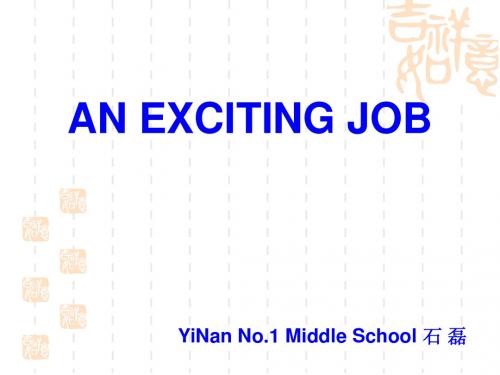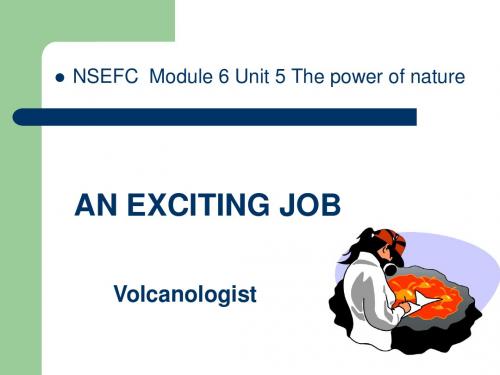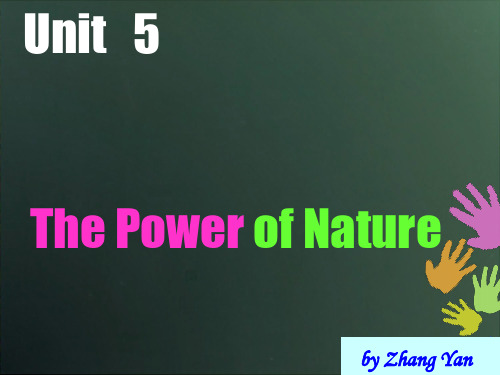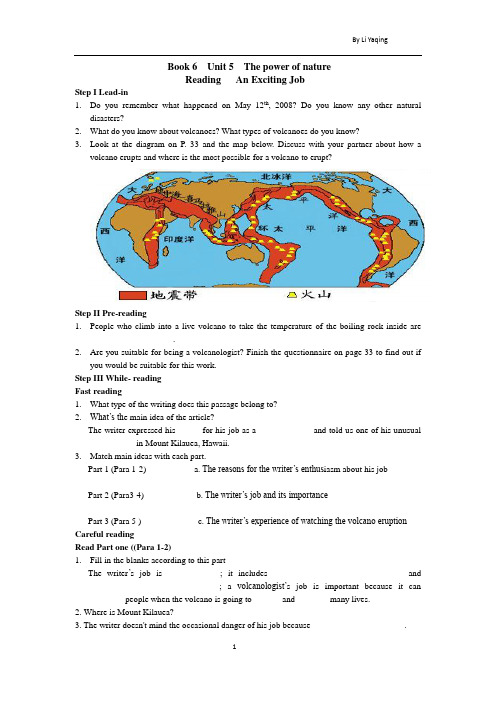book6 unit5reading The power of nature
- 格式:ppt
- 大小:1.42 MB
- 文档页数:21






Book 6 Unit 5 The power of natureReading An Exciting JobStep I Lead-in1.Do you remember what happened on May 12th, 2008? Do you know any other naturaldisasters?2.What do you know about volcanoes? What types of volcanoes do you know?3.Look at the diagram on P. 33 and the map below. Discuss with your partner about how avolcano erupts and where is the most possible for a volcano to erupt?Step II Pre-reading1.People who climb into a live volcano to take the temperature of the boiling rock inside are___________________.2.Are you suitable for being a volcanologist? Finish the questionnaire on page 33 to find out ifyou would be suitable for this work.Step III While- readingFast reading1.What type of the writing does this passage belong to?2.What’s th e main idea of the article?The writer expressed his _____ for his job as a ____________ and told us one of his unusual ___________in Mount Kilauea, Hawaii.3.Match main ideas with each part.Part 1 (Para 1-2) a. The reasons for the writer’s enthus iasm about his jobPart 2 (Para3-4) b. The writer’s job and its importancePart 3 (Para 5 ) c. The writer’s experience of watching the volcano eruption Careful readingRead Part one((Para 1-2)1.Fill in the blanks according to this partThe writer’s job is ____________; it includes _______________________________and ______________________________; a volcanologist’s job is important because it can ________ people when the volcano is going to ______ and _______ many lives.2. Where is Mount Kilauea? ____________________________________________________3. The writer doesn't mind the occasional danger of his job because _____________________.Read Part two ((Para 3-4)4. Fill in blanks about the writer’s experience of the volcano.My first experience: I was ____ asleep when my bed began _______ and I heard a _______ sound, like a ______ passing nearby. Then I found my bedroom was as ________ as day, and red lava ___________ hundreds of meters into the air. The next day, three of us wanted to get close to the ______. We put on ___________suits, ________, big _______ and special ______, which made us look like __________. We slowly ________________ to the edge of the crater to collect some _____ for ____________.Read Part three ((Para 5)5. What attracts the writer after he has studied volcanoes for more than twenty years?________________________________________________________________________6. Analyze the writer’s feelings: find out the words (para1 and para 5) that indicate the wri ter’s feelings about being a volcanologist.Para 1:___________; ________; _________;Para 5: __________; ________;Step IV Post-readingDiscussionHaving learnt a little more about the work of a volcanologist, do you think it is an occupation youwould enjoy? Give your reasons.Sentence- pattern imitation1.Sometimes working outdoors, sometimes in an office, sometimes using scientific equipmentand sometimes meeting local people and tourists, I am never bored.Structure of the sentence: s ometimes doing…, sometimes doing..., sometimes doing…,subject (主语)+ predicate (谓语)….【模仿1】有时学唱英文歌曲,有时讨论两国文化之间的差异,有时享受英语话剧,我觉得英语角活动非常有趣。
人教版高中英语Book6 Unit 5 The Lake of Heaven warming up andspeaking 教学设计定安县城南中学王秀英Teaching aims:1. Know the basic information such as locations, sights of Tianchi and Changbaishan.2. Use some useful structures to describe a place.3. Develop students’reading abilities.Teaching key points:1. 1. Master the basic information such as locations, sights ofTianchi and Changbaishan.2. 2. Use some useful structures to describe a place.Teaching difficulties: Develop students’reading abilities.Teaching procedures:Step 1 : Lead in1. Have you enjoyed any natural wonders? Share your experience and feelings.2. Look at some pictures and guess what they are.Mount Hua Shan, Mount Tai Shan, Jiu Zhai Gou, Mount Changbaishan, Tianchi,The Lake of Heaven5)What is the connection between the Manchu people and Tianchi?2.Check the answers.Step 5 : ConsolidationJudge the following sentences true or false.1. Changbaishan is the second largest nature reserve in China.2. The peak of Changbaishan can reach as high as 2,000 meters.3. You can see a lot of black bears, leopards or cranes in Changbaishan.4. Tianchi is a lake in the crater of an extinct volcano.5. The ancestors of the Manchu people were believed to be good at language and persuasion.Step 6: Homework1. Surf the Internet to find more information about the Lake of Heaven.2. Preview Exercise 2 on page 40.Book6 Unit 5 The Lake of Heaven说课稿定安县城南中学王秀英一、教材分析(一)教材概述:本单元以“The power of nature(自然界的威力)”为中心话题,旨在通过本单元的学习,了解火山、飓风、地震和洪水,听说读写等语言知识和语言技能主要围绕“自然灾害”及如何预防和利用自然灾害这一主题设计的。
选修6 Unit 5 The power of natureⅠ.重点单词识记1.adj.贵重的;珍贵的2.v i.& v t.惊慌;n.惊慌;恐慌→过去式_________→过去分词_________ 3.v i.洗澡;游泳→__________n.洗澡4.n.图解;图表;示意图5.n.波浪;波涛;v i.波动;起伏;挥手6.n.潜在性;可能性;潜能;adj.可能的;潜在的7.v i.摇晃;摇动;颤抖8.v t.保证;担保9.n.设备;装备→v t.装备于;配备于→一件设备_____________10.adj.实在的;实际的→ad v.说实在的;实际上11.adj.不舒服的;不舒适的→_ (反义词) adj.舒服的12.adj.失去知觉的;未察觉的→(反义词) adj.有意识的13.v t.任命;委派→n.约定;任命14.v t.评估;评价;估计→n.评估15.adj.绝对的;完全的→ad v.绝对地;完全地16.n.一套外衣;套装;v t.适合;使适宜→adj.合适的17.v t.射中;射伤→过去式_____过去分词→_________n.射击;枪炮声18.adj.忧虑的;不安的→n.担心;焦虑;渴望19..多种多样的;不同的→n.多种多样;多样性20.n.欣赏;感激;感谢→v t.欣赏;感激Ⅱ.重点短语识记1.与……相比2.保护……免受……伤害3.被委派为……4.全部焚毁5.即将做某事;马上就要做某事6.前往7.匆匆看一遍8..由……到……不等9.生产;产生Ⅲ.经典原句默写与背诵1.,we are not completely powerless.无论我们多么脆弱,我们不是一点力量都没有的。
2.the information,I help other scientists to predict where lavafrom the volcano will flow next and how fast.收集和评估这些信息之后,我就帮助其他科学家一起预测熔岩接着将往何处流,流速是多少。